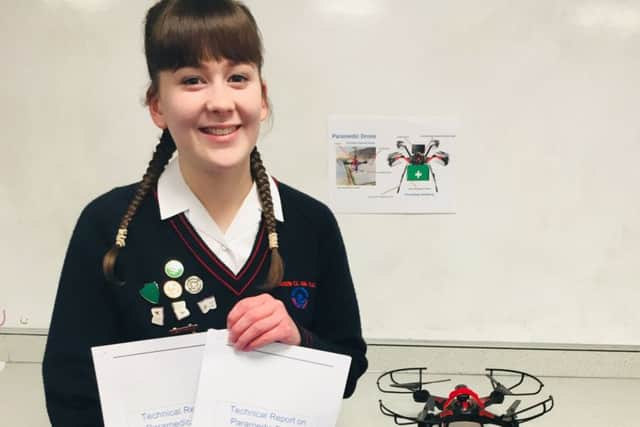Young Worthing scientist praised for innovation as her paramedic drone wins a place in Big Bang UK final
and live on Freeview channel 276
Emma Phillips designed her paramedic drone to help alleviate some of the time pressures put on the NHS service.
Emma said: “My idea for this project stemmed from the pressure put on the NHS service to respond to emergencies quickly and so I wanted to create a drone allowing some of that pressure to be alleviated.
Advertisement
Hide AdAdvertisement
Hide Ad“It uses a transmitting screen to connect patients with an NHS professional, allowing them to assess and advise conditions during emergency situations; also coming with the ability to distribute medical equipment and supplies particularly to those in more remote areas.


“It is a quick, inexpensive and eco-friendly way to respond to a crisis before or instead of an ambulance.”
Emma, a year-nine student at Davison CE High School for Girls, has been selected to compete at the UK finals of the Big Bang UK Young Scientists & Engineers Competition in March.
Mercedes Willard, STEM co-ordinator at Davison CE High School for Girls, said: “This is a fantastic project which really demonstrates the innovative and creative ideas students have to solve the problems we face today.
Advertisement
Hide AdAdvertisement
Hide Ad“We are incredibly proud of Emma, she has truly developed a passion for science and engineering, which is evident from her hard work and perseverance.
“We are sure she will impress the judges at The Big Bang competition final and inspire other young female engineers to take up projects such as these.”
Emma’s paramedic drone would allow trained staff to speak to and assess patients via video screens while ambulances are en route.
She assessed the current service provided by doctors and paramedics, then looked at a solution that could be used in the near-future.
Advertisement
Hide AdAdvertisement
Hide AdEmma said: “”I have always loved science and this project became a personal challenge for me, giving me the opportunity to develop a range of new skills and leading me to become a finalist for which I am overjoyed about and now very excited to attend the finals in March.”